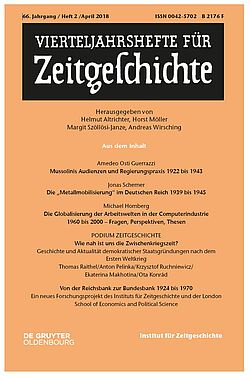Issue 2/2018

Content Overview: English Titles and Abstracts:
- Amedeo Osti Guerrazzi: Mussolini’s System of Governmental Practice as Reflected in the Dictator’s Audiences, 1922 to 1945.
- Jonas Scherner: Lessons Learnt and Not Learnt. Metal Mobilisation in the German Reich, 1939 to 1945.
- Michael Homberg, Human | Microchip. The Globalisation of Working Environments in the Computing Industry, 1960 to 2000 – Questions, Perspectives, Theses.
- Contemporary History Podium, How Akin are We to the Interwar Period? History and Current Relevance of the Democratic State Formations after the First World War in Germany, Austria, Poland, Lithuania and Czechoslovakia.
Abstracts
Amedeo Osti Guerrazzi, Mussolini’s System of Governmental Practice as Reflected in the Dictator’s Audiences, 1922 to 1945
Between 1923 and 1945, Benito Mussolini, Italian Prime Minister and Duce of Fascism, met thousands of people and granted more than 90 000 audiences. The historiographical appraisal of this politically important system of receptions and visits only began very recently – and is now possible on a whole new level due to the development of a database of the audiences by the German Historical Institute in Rome. For a long time, research relied on the memoirs of (mostly) high-ranking former Fascists, who (after the Second World War) described their personal relationships with Mussolini, often also for exculpatory reasons. Amedeo Osti Guerrazzi shows how historiography was influenced by these narratives, even though their veracity is highly dubious. Obviously these authors tried to create the image of a lenient, even “good” dictator, who was supposed to differ from Adolf Hitler in every possible way. Amedeo Osti Guerrazzi deconstructs the Fascist memoir narratives and reveals contradictions and distortions. Further he examines the organisation, ceremonies and political content of the audiences in order to discover more about the functioning and style of government of the dictator. In this manner, an augmented view of the “Mussolini System” with many more facets arises.
Jonas Scherner, Lessons Learnt and Not Learnt. Metal Mobilisation in the German Reich, 1939 to 1945
During the Second World War, metal mobilisation was implemented in Germany, i.e. the recycling of metal products which were still in use, such as household goods, copper coins, church bells or power lines. Metal mobilisation contributed significantly to the coverage of German tin and copper usage for the war industry (both metals being essential raw materials). Its implementation was decisively shaped by the experiences with metal mobilisation during the First World War. Accordingly, the Nazi regime attempted to postpone requisitions for as long as possible, even if this entailed resorting to measures incurring higher costs for the war economy, as requestions could lead to discontent with in the population. This, by all means successful learning process, did not, however, prevent an over-mobilisation aiming at long perseverance after 1943, when Germany lost the military initiative in a war waged on many fronts.
Michael Homberg, Human | Microchip. The Globalisation of Working Environments in the Computing Industry, 1960 to 2000 – Questions, Perspectives, Theses
The globalisation of working environments in the computer industry began during the late 1950s. Due to the support of information and communication technologies in the Global South by the industrialised nations, a phase of knowledge and cultural transfer began in the Indian high-technology sector, which initiated global migration processes and supported the adaptation of national innovation cultures. In this process, Silicon Valley became the Mecca for computer specialists. After decades of developmental engagement in Asia, the migration of Indian specialists to Europe and to the United States resulted in potent effects. The history of the computer industry in the USA, the Federal Republic of Germany and India, can thus be read as a history of global interconnections. The article uses the example of the high-tech industries to highlight the changes in the living and working environments in the computing industry. On the one hand, this contribution places these developments in the context of new debates on the crisis and change of “work-centred society” in a “digital age”, on the other hand it serves as an appeal for a broader development of a history of knowledge covering the process of computerisation.
Contemporary History Podium, How Akin are We to the Interwar Period? History and Current Relevance of the Democratic State Formations after the First World War in Germany, Austria, Poland, Lithuania and Czechoslovakia
The interwar period was a phase of the formation of new states and of democratic awakening, but also a time of crises and the failure of democracies as well as the establishment of authoritarian and dictatorial systems. Until recently, it was largely overlooked by research and the general public. Given the recent increase of right-wing populist currents and authoritarian tendencies in Europe, interest has once again grown. The second “Contemporary History Podium” is thus dedicated to the question of how akin we are to the interwar period. How is it perceived in different countries which constituted themselves as democracies at the end of the First World War after the fall of the Romanov, Habsburg and Hohenzollern Empires? Also what is the relevance of this history for the present? Ota Konrád (Charles University Prague), Ekaterina Makhotina (University of Bonn), Anton Pelinka (Central European University Budapest), Thomas Raithel (Institute for Contemporary History Munich–Berlin) und Krzysztof Ruchniewicz (Willy Brandt Center, Wrocław University) look into these questions utilising the examples of Czechoslovakia, Lithuania, Austria, Germany and Poland.
The debate continues in May 2018 during a panel discussion at the Institute for Contemporary History in Munich, which will be made available on the VfZ homepage.
